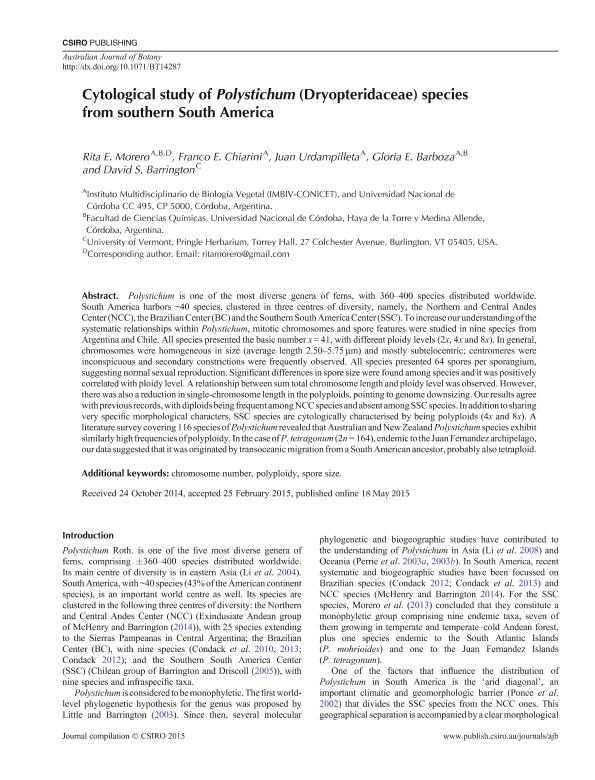Mostrar el registro sencillo del ítem
dc.contributor.author
Morero, Rita
dc.contributor.author
Chiarini, Franco Ezequiel

dc.contributor.author
Urdampilleta, Juan Domingo

dc.contributor.author
Barboza, Gloria Estela

dc.contributor.author
Barrington, D.
dc.date.available
2017-04-21T16:05:49Z
dc.date.issued
2015-05
dc.identifier.citation
Morero, Rita; Chiarini, Franco Ezequiel; Urdampilleta, Juan Domingo; Barboza, Gloria Estela; Barrington, D.; Cytological study of Polystichum (Dryopteridaceae) species from southern South America; Csiro Publishing; Australian Journal Of Botany; 63; 5; 5-2015; 403-414
dc.identifier.issn
0067-1924
dc.identifier.uri
http://hdl.handle.net/11336/15556
dc.description.abstract
Polystichum is one of the most diverse genera of ferns, with 360–400 species distributed worldwide. South America harbors ~40 species, clustered in three centres of diversity, namely, the Northern and Central Andes Center (NCC), the Brazilian Center (BC) and the Southern South America Center (SSC). To increase our understanding of the systematic relationships within Polystichum, mitotic chromosomes and spore features were studied in nine species from Argentina and Chile. All species presented the basic number x = 41, with different ploidy levels (2x, 4x and 8x). In general, chromosomes were homogeneous in size (average length 2.50–5.75 µm) and mostly subtelocentric; centromeres were inconspicuous and secondary constrictions were frequently observed. All species presented 64 spores per sporangium, suggesting normal sexual reproduction. Significant differences in spore size were found among species and it was positively correlated with ploidy level. A relationship between sum total chromosome length and ploidy level was observed. However, there was also a reduction in single-chromosome length in the polyploids, pointing to genome downsizing. Our results agree with previous records, with diploids being frequent among NCC species and absent among SSC species. In addition to sharing very specific morphological characters, SSC species are cytologically characterised by being polyploids (4x and 8x). A literature survey covering 116 species of Polystichum revealed that Australian and New Zealand Polystichum species exhibit similarly high frequencies of polyploidy. In the case of P. tetragonum (2n = 164), endemic to the Juan Fernandez archipelago, our data suggested that it was originated by transoceanic migration from a South American ancestor, probably also tetraploid.
dc.format
application/pdf
dc.language.iso
eng
dc.publisher
Csiro Publishing

dc.rights
info:eu-repo/semantics/openAccess
dc.rights.uri
https://creativecommons.org/licenses/by-nc-sa/2.5/ar/
dc.subject
Polystichum
dc.subject
Chromosomes
dc.subject
Polyploidy
dc.subject
Spore Size
dc.subject.classification
Ciencias de las Plantas, Botánica

dc.subject.classification
Ciencias Biológicas

dc.subject.classification
CIENCIAS NATURALES Y EXACTAS

dc.title
Cytological study of Polystichum (Dryopteridaceae) species from southern South America
dc.type
info:eu-repo/semantics/article
dc.type
info:ar-repo/semantics/artículo
dc.type
info:eu-repo/semantics/publishedVersion
dc.date.updated
2017-04-11T17:54:37Z
dc.journal.volume
63
dc.journal.number
5
dc.journal.pagination
403-414
dc.journal.pais
Australia

dc.journal.ciudad
Collingwood
dc.description.fil
Fil: Morero, Rita. Consejo Nacional de Investigaciones Científicas y Técnicas. Centro Científico Tecnológico Córdoba. Instituto Multidisciplinario de Biología Vegetal (p); Argentina. Universidad Nacional de Córdoba; Argentina
dc.description.fil
Fil: Chiarini, Franco Ezequiel. Consejo Nacional de Investigaciones Científicas y Técnicas. Centro Científico Tecnológico Córdoba. Instituto Multidisciplinario de Biología Vegetal (p); Argentina. Universidad Nacional de Córdoba; Argentina
dc.description.fil
Fil: Urdampilleta, Juan Domingo. Consejo Nacional de Investigaciones Científicas y Técnicas. Centro Científico Tecnológico Córdoba. Instituto Multidisciplinario de Biología Vegetal (p); Argentina. Universidad Nacional de Córdoba; Argentina
dc.description.fil
Fil: Barboza, Gloria Estela. Consejo Nacional de Investigaciones Científicas y Técnicas. Centro Científico Tecnológico Córdoba. Instituto Multidisciplinario de Biología Vegetal (p); Argentina. Universidad Nacional de Córdoba; Argentina
dc.description.fil
Fil: Barrington, D.. University of Vermont; Estados Unidos
dc.journal.title
Australian Journal Of Botany

dc.relation.alternativeid
info:eu-repo/semantics/altIdentifier/url/http://www.publish.csiro.au/bt/BT14287
dc.relation.alternativeid
info:eu-repo/semantics/altIdentifier/doi/https://doi.org/10.1071/BT14287
Archivos asociados
